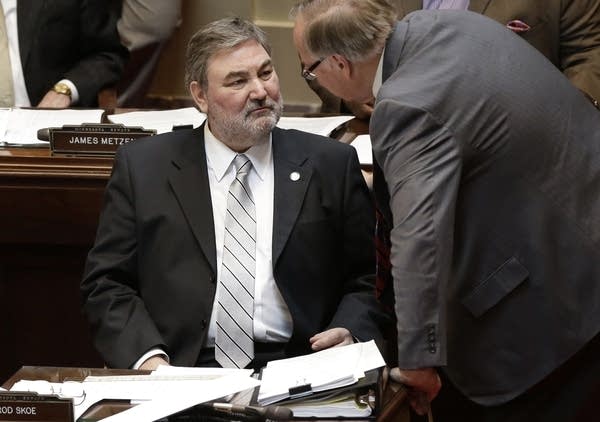Senate Dems turn around tax bill vote after initial defeat
Go Deeper.
Create an account or log in to save stories.
Like this?
Thanks for liking this story! We have added it to a list of your favorite stories.

It took two tries, but the tax bill to raise $1.8 billion in new revenue passed the Minnesota Senate Monday night.
Two Senate Democrats were forced to switch their votes after the bill was first defeated. The initial failure prompted Republicans to claim Senate DFL leaders could pass their tax hikes only by twisting arms of some nervous first-term members.
The debate on the Senate tax bill had been going true to form. Democrats discussed the merits of the bill while Republicans criticized it as a job killer. DFL Senate Majority Leader Tom Bakk even told reporters last week that their majority was large enough that a few first-term members would not have to vote for the bill. The only problem for Bakk was that someone forgot to count.
When the roll was closed and the vote tally came in at 32 ayes and 34 nays, Senate Pres. Sandy Pappas sighed audibly and announced the result, "The bill is not adopted. The bill fails to pass."
Turn Up Your Support
MPR News helps you turn down the noise and build shared understanding. Turn up your support for this public resource and keep trusted journalism accessible to all.
"I ran on an education platform, and I wasn't willing to put those education investments at risk by not having this tax bill."
Seven Democrats joined all but one Republican to vote against the bill. Majority Leader Bakk said a few first-term members were confused because the initial tally showed more than one Republican voting for the bill. Bakk said they never decided beforehand which members would vote for the bill.
"The understanding just was that there were going to be 34 people, and I think some of the newer members probably weren't familiar with the shenanigans that were going on by the Republicans voting for the bill," Bakk said. "I think some new members who were willing to vote yes the first time felt like they didn't have to because there were adequate votes to pass it."
The move was a procedural nightmare for Democrats. They quickly recessed, met privately and then moved to reconsider the bill.
Two Democrats, senators John Hoffman of Champlin and Greg Clausen of Apple Valley, then had to switch their votes to pass the bill. Clausen said he decided to switch because he was worried the Senate would not be able to commit to spending priorities if the tax bill failed.
"For me, what it came down to quite honestly is that we made a lot of gains in education," Clausen said. "I ran on an education platform, and I wasn't willing to put those education investments at risk by not having this tax bill."

Republicans were gleeful that Democrats botched a vote on one of the most closely watched bills of the session. It also helps them that two first-term Democrats are on record for initially opposing but then supporting a bill with $1.8 billion in tax hikes.
GOP Senate Minority Leader David Hann said he was not buying Bakk's contention that he did not have to twist arms to get more votes.
"The bill didn't have enough votes to pass. And then they went into the back room and the DFL party bosses cracked the whip, changed a few votes and they came out and took the vote the party wanted them to take and they passed their bill," Hann said. "I think this shows that this bill does not have the support of the members of the DFL caucus unless they make sure they can get them in line."
The bill raises income taxes for the top six percent of earners in the state. It also expands the sales tax to clothing and some personal services like haircuts and oil changes and lowers the sales tax rate. And similar to plans proposed by Gov. Mark Dayton and House DFLers, the Senate DFL plan raises taxes on cigarettes.
Republicans called the bill bad for business. They also said that the expansion of the sales tax would mean every Minnesotan would be forced to pay higher taxes. Republican Sen. Julianne Ortman wanted to know why there were considering a $1.8 billion tax increase to erase a $627 million budget deficit.
"Our current source of revenues and the strength of the economy will pay for every dollar in the deficit and then some," Ortman said. "We don't need to ask Minnesotans to reach into their pockets to pay more for Tylenol, for cough medicine, for electricity rates. We don't need to do that, so why are we doing this today?"
DFL leaders say the higher taxes are needed to commit more money to schools, colleges and property tax relief. DFL Sen. Leroy Stumpf of Plummer said the higher taxes are necessary to offset spending cuts over the last decade.
"Don't forget about how college tuition had shot up because we cut higher education, or child care had shot up because we made reductions so there are a lot of good things that this tax bill funds," Stumpf said.
The Senate action now sets up a negotiation with the governor and House Democrats over taxes and spending. Bakk said the back-and-forth vote could indicate there may not be the appetite to spend much more than what the Senate already proposes.
Dear reader,
Political debates with family or friends can get heated. But what if there was a way to handle them better?
You can learn how to have civil political conversations with our new e-book!
Download our free e-book, Talking Sense: Have Hard Political Conversations, Better, and learn how to talk without the tension.




